Gain insight into why the number 8 symbolizes new beginnings in the Bible, and explore its mysterious presence in your life.

8 in the Bible
Isn't it curious how the number 8 repeatedly surfaces in your life, from birthdays to addresses, only to discover its profound symbolism in the Bible too?
You're about to uncover how this digit signifies new beginnings, from Noah's Ark to the resurrection on the eighth day, and even why circumcision occurs on the eighth day. Each instance isn't just a random occurrence but a piece intricately woven into the fabric of biblical teachings.
As you peel back the layers, you'll find yourself questioning how these patterns influence your understanding of renewal and eternity.
So, why does the number 8 hold such significance, and what can you learn from it?
Key Takeaways
- The number 8 signifies new beginnings, renewal, and transition to the divine in biblical contexts.
- Noah's Ark narrative, with eight survivors, symbolizes rebirth and the promise of new life.
- Circumcision on the eighth day represents a covenant with God and a fresh start in faith.
- Jesus' resurrection and the Eight Beatitudes embody transformative power, eternal life, and new beginnings.
The Symbolism of Eight
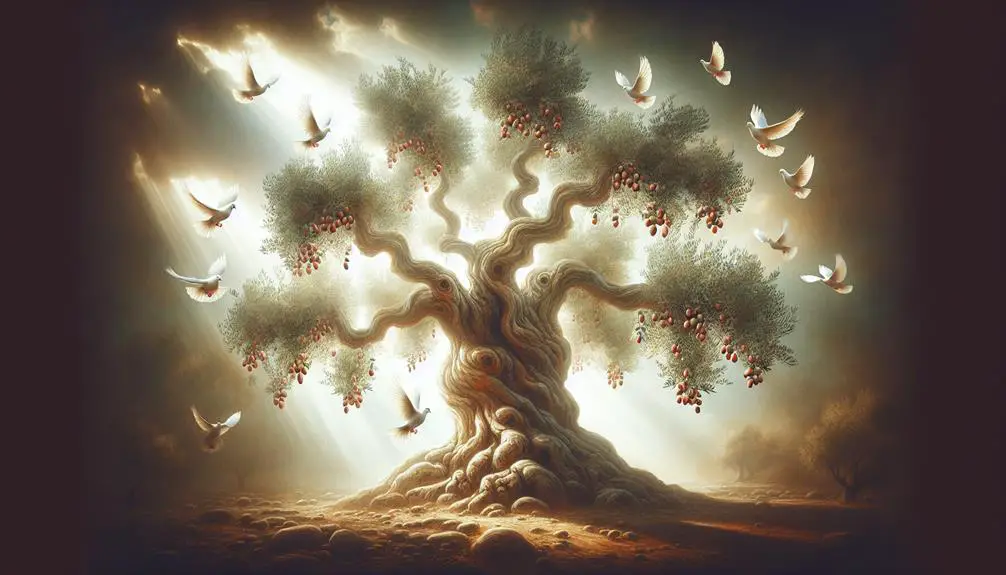
In biblical contexts, the number eight symbolizes new beginnings and renewal, a concept deeply embedded within the narratives and teachings of the text. This symbolism isn't arbitrary but is woven intricately into the fabric of biblical storytelling and its architectural manifestations, most notably seen through the constructs of the eight-spoked wheel and octagonal architecture. You'll find these elements not just as aesthetic choices but as profound symbols reflecting deeper theological truths.
The eight-spoked wheel, for instance, transcends its physical form to represent the universal order and eternal life, themes central to biblical teachings. Its presence in religious artifacts and scripture illustrations serves as a reminder of God's omnipotence and the cyclical nature of life and redemption. This iconography encourages a reflective contemplation on the perpetual chances for renewal and the unfailing grace afforded by the divine.
Similarly, octagonal architecture in places of worship subtly communicates the idea of new beginnings. The octagon, deriving its form from the number eight, is emblematic of the transition from the earthly to the divine. This architectural choice isn't merely for structural elegance but is imbued with profound symbolism. It represents the intermediary space where the temporal meets the eternal, a concept deeply resonant with the Christian belief in resurrection and eternal life.
These symbols, the eight-spoked wheel and octagonal architecture, aren't just artistic expressions but are imbued with deep theological significance. They serve as constant reminders of the themes of renewal and rebirth, echoing the biblical promise of new beginnings. Through these symbols, the number eight is elevated from a mere numeral to a profound emblem of faith and hope.
Noah's Ark and New Beginnings
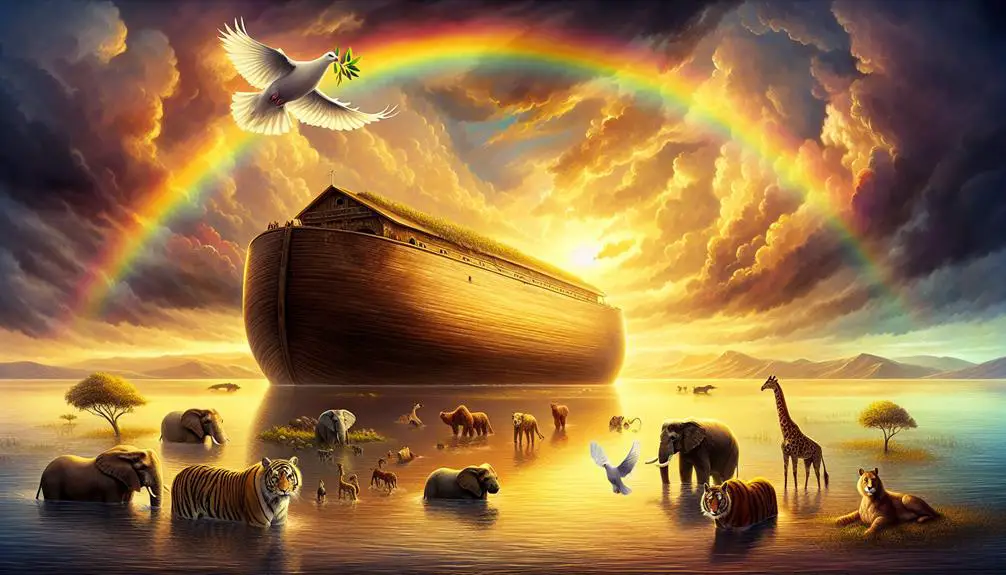
Reflecting on Noah's Ark, one observes a quintessential narrative of renewal and rebirth within biblical lore, offering profound insights into the significance of the number eight. This story isn't just about a deluge; it's a profound exploration of beginnings, underscored by the eight individuals—Noah, his wife, his three sons, and their wives—who emerge from the Ark to repopulate the world. Their emergence symbolizes a new genesis, a rebirth of humanity intertwined with the sacredness of the number eight.
The Ark itself, a vessel for saving diverse animal species, further accentuates this theme of renewal. Each species, taken by sevens or twos, represents the preservation and continuation of life. The meticulous selection and care for these animals underscore a divine mandate for biodiversity and ecological balance, setting a precedent for stewardship and coexistence.
Moreover, the flood duration—forty days and nights—followed by the extensive waiting period before disembarking, highlights a period of transition and purification. This temporal aspect, culminating in the eventual receding of waters, echoes the transformative power of trials and the subsequent emergence into a renewed world.
In analyzing Noah's Ark, you're invited to ponder not just the historical or mythical dimensions of the narrative but its symbolic richness. It's a testament to resilience, divine covenant, and the perpetual cycle of destruction and renewal. The story, with its emphasis on eight survivors, animal species' preservation, and the flood duration, becomes a compelling allegory for rebirth and the indomitable spirit of life itself.
Circumcision on the Eighth Day
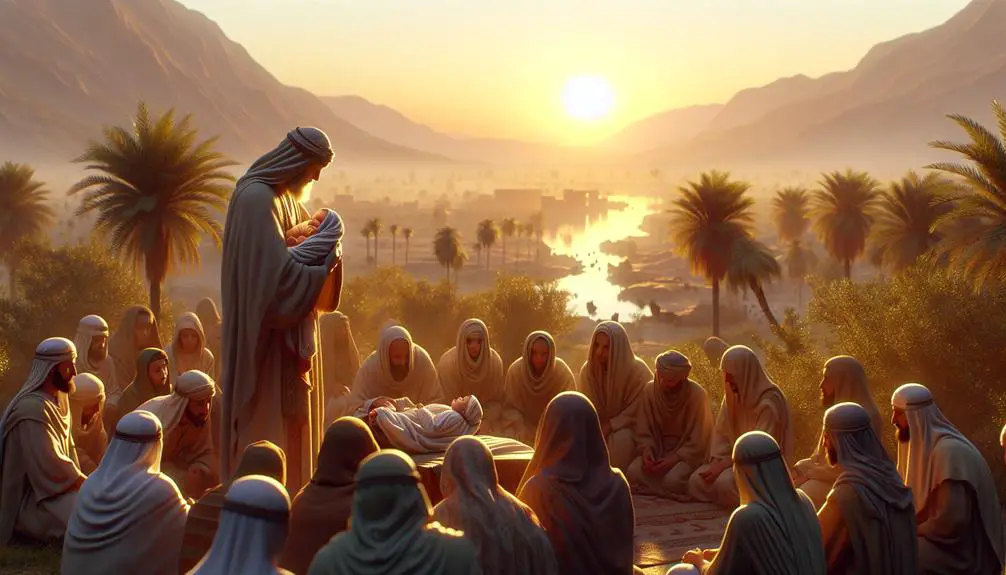
Moving from the symbolic rebirth represented by Noah's Ark, consider the practice of circumcision on the eighth day as another profound biblical instance where the number eight embodies a new beginning and covenantal significance. This ritual, deeply ingrained in both cultural practices and religious observance, extends beyond a mere physical act, intertwining with spiritual purification and the establishment of a covenant between God and His people.
From a medical perspective, you'll find that this timing isn't arbitrary. Modern science suggests that the eighth day post-birth is the most optimal for such a procedure due to natural physiological developments. It's when vitamin K levels, crucial for blood clotting, peak in a newborn, minimizing the risk of hemorrhage and enhancing recovery. This convergence of divine instruction and medical insight highlights a fascinating intersection where faith and science coalesce, offering a layer of rationality to ancient practices.
Moreover, the cultural practices surrounding circumcision on the eighth day are as varied as they're significant. This rite of passage not only marks a male child's formal entry into his religious community but also serves as a tangible reaffirmation of a family's commitment to their faith and ancestral covenant. The ceremony, rich with symbolism and tradition, reinforces communal bonds and continuity of belief, bridging generations through shared ritual.
Analyzing circumcision on the eighth day reveals a multifaceted symbol of beginning anew, underscored by divine command, medical reasoning, and the nurturing of cultural identity. It's a practice that, despite its ancient origins, continues to hold profound relevance and meaning in the lives of many today.
Eight Souls Saved
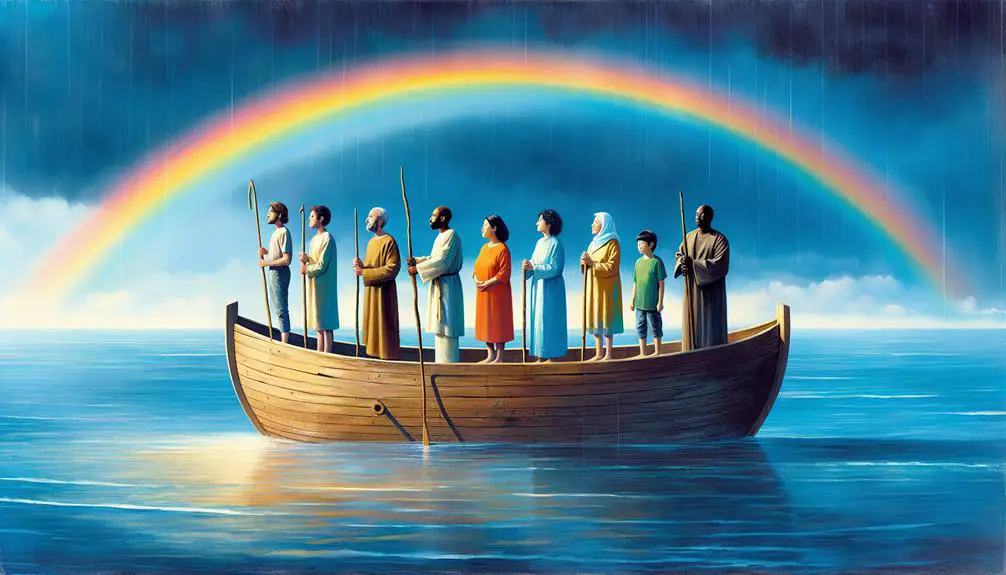
The account of eight souls saved during Noah's Ark narrative not only symbolizes a physical deliverance but also underscores a profound spiritual rebirth, marking a pivotal moment in biblical history. This event, set against the backdrop of a global flood, highlights the themes of judgment, mercy, and salvation that permeate the scriptural text. The eight individuals—Noah, his wife, his three sons, and their wives—represent a remnant, chosen to survive the cataclysm and repopulate the earth. Their survival is a testament to their righteousness and God's grace in the face of widespread corruption.
Analyzing this narrative, you find that the number eight itself carries significant symbolic weight in the Bible, often associated with new beginnings and resurrection. The salvation of these eight souls through ancient navigation aboard the Ark can be seen as a metaphor for the journey of faith and the transition from the old world of sin to the new world of righteousness. This event sets a precedent for the biblical theme of being saved through water, a motif that finds echoes in later texts, such as the crossing of the Red Sea and the ritual of baptism.
Furthermore, the story of Noah's Ark and the eight survivors is a pivotal reference point in understanding ancient navigation techniques. Despite the mythological elements, the account provides insights into early human attempts to comprehend and survive natural disasters through ingenuity and faith. The Ark, as described, serves not only as a means of physical preservation but also as a symbol of divine providence and the possibility of rebirth and redemption.
The Feast of Tabernacles
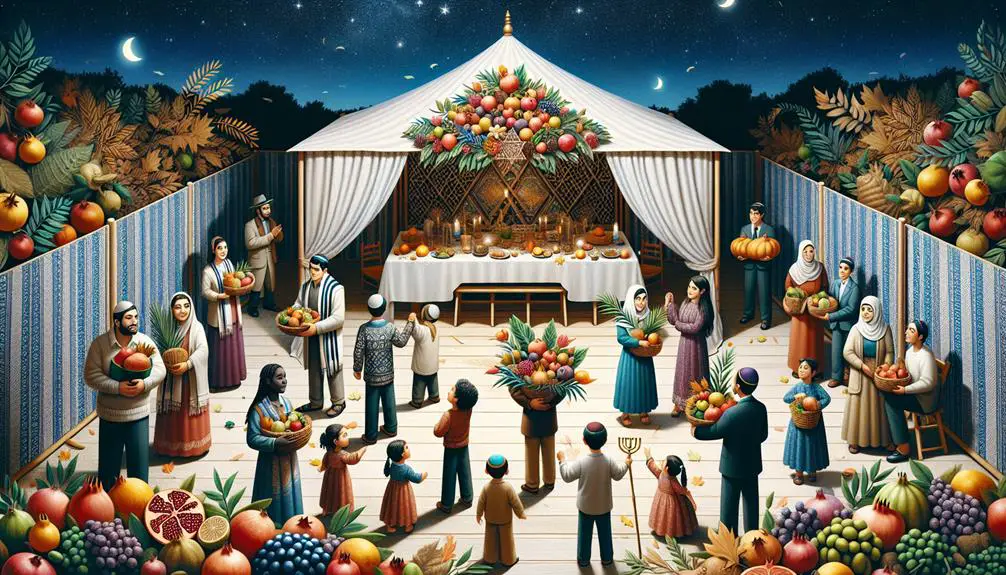
You'll find that the Feast of Tabernacles stands out not only for its eight-day celebration but also for its deep symbolic meanings within a biblical context.
This period serves as a vivid reminder of the Israelites' wilderness journey, embodying themes of provision and protection.
Analyzing its duration alongside the embedded symbolism offers insights into its significance in biblical numerology and theology.
Celebration Duration
In examining the Feast of Tabernacles, it's essential to note that its celebration duration spans eight days, reflecting its deep symbolic significance within a biblical context. This period links directly to harvest festivals and Sabbath observations, underscoring a time of thanksgiving and rest, respectively.
Day |
Activity |
Significance |
|---|---|---|
1 |
Gathering |
Marks the start, emphasizing community and thanksgiving for the harvest. |
2-7 |
Daily Offerings |
Continuous worship, reflecting ongoing devotion and gratitude. |
8 |
Solemn Assembly |
A special Sabbath, concluding the feast with a day of rest and reflection. |
This structured duration not only underscores the importance of agricultural cycles in ancient times but also embeds a deeper rhythm of work, worship, and rest into the fabric of biblical observance.
Symbolic Meanings
Delving deeper into the Feast of Tabernacles reveals layers of symbolism that resonate with ancient practices and theological concepts, shaping its enduring significance. Key symbols within this celebration include:
- Water symbolism: Represents purification and life, connecting the feast to the Garden of Eden's imagery of abundance and divine provision.
- Garden of Eden: Evokes paradisiacal imagery, suggesting a return to a state of original blessing and close communion with God.
- Temporary shelters: Symbolize the transient nature of life and the Israelites' dependence on God during their desert wanderings.
- Harvest: Marks God's provision and faithfulness, tying back to themes of fertility and blessing in the Promised Land.
These elements collectively underscore the Feast's role in reiterating themes of dependency, divine provision, and the hope of restoration.
Resurrection on the Eighth Day

You'll find that the number eight carries profound symbolism in biblical narratives, particularly when examining Jesus' resurrection story.
This event, occurring on what's often referred to as the eighth day, embodies the concept of new beginnings and eternal life.
Analyzing this symbolism offers insights into the transformative power and hope embedded within the Christian faith.
Symbolism of Number Eight
The symbolism of the number eight is deeply entrenched in the notion of resurrection and new beginnings, particularly highlighted by the resurrection on the eighth day. This number transcends simple numerology, weaving a complex tapestry of rebirth and renewal within the biblical narrative. In this context, eight becomes a symbol of hope and eternal life, marking the transition from worldly to divine.
Consider these aspects:
- Eight planets in our solar system, symbolizing cosmic balance and order.
- Octagonal shapes often represent regeneration, mirroring the eight-day resurrection theme.
- The number eight signifies a new era or chapter, suggesting a departure from the old into a realm of unlimited possibilities.
- In biblical terms, eight is associated with Jesus' resurrection, underscoring its significance in Christian theology, albeit without delving into specific narratives.
Jesus' Resurrection Story
Building on the symbolic significance of the number eight, let's examine how Jesus' resurrection on the eighth day embodies the theme of rebirth and new beginnings within Christian theology. This pivotal event, as narrated in the Gospels, marks not just a defeat of death but a profound transformation.
The empty tomb stands as a silent witness to this miraculous occurrence. Mary Magdalene, among the first to encounter the risen Christ, becomes a herald of this new reality. Her encounter underscores the personal and communal transformation that the resurrection signifies.
This moment transcends a mere return to life; it inaugurates a new creation ethos, where the old paradigms of sin and death are overcome. Through this lens, Jesus' resurrection on the eighth day serves as a cornerstone of Christian faith, symbolizing ultimate rebirth and eternal life.
New Beginnings Concept
Jesus' resurrection on the eighth day fundamentally embodies the New Beginnings concept, marking a transformative moment in Christian theology where death's finality is challenged and a new era of eternal life begins. This pivotal event is deeply interwoven with the symbolic significance of the number eight in biblical narratives, such as:
- The Genesis creation story, culminating in a world teeming with life.
- The Exodus liberation, representing a journey from slavery to freedom.
- Circumcision on the eighth day, symbolizing a covenant with God.
- The promise of a new beginning after the Flood, with Noah as the harbinger of renewal.
These instances encapsulate the essence of regeneration and redemption, illustrating how the concept of new beginnings permeates the fabric of biblical teachings.
The Eight Beatitudes

In Matthew's Gospel, you'll find the Eight Beatitudes presenting foundational principles that underscore Christian ethics and spirituality. These Beatitudes, delivered during the Sermon on the Mount, offer you a glimpse into the heart of Jesus' teachings, emphasizing virtues such as humility, mercy, and peace. They're not merely ancient words but carry profound contemporary applications, urging you to live a life that reflects the kingdom of heaven.
The first subtopic, involving sermon interpretations and contemporary applications, invites you to delve deeper into these teachings' relevance today. Scholars and theologians have extensively analyzed the Beatitudes, suggesting they're not just blessings but radical calls to action. For instance, 'Blessed are the poor in spirit' can be interpreted as an invitation to recognize your spiritual poverty and dependence on God. This humility is foundational for spiritual growth in a world often dominated by pride and self-reliance.
Contemporary applications of the Beatitudes encourage you to engage in social justice, showing mercy to the oppressed and seeking peace in conflict-ridden contexts. They challenge you to be pure in heart in an era of cynicism and disillusionment, offering hope and light in dark places.
The Beatitudes, therefore, aren't passive statements but dynamic, transformative principles that compel you to act justly, love mercy, and walk humbly with your God. They're as relevant today as they were two millennia ago, guiding you towards a more compassionate, just, and humble existence.
Numerical Patterns and Prophetic Meanings

Throughout history, scholars have observed that numbers carry significant prophetic meanings within biblical texts, offering deep insights into spiritual truths and divine designs. You'll find that these patterns aren't just coincidental but are intricately woven into the narrative of the Scriptures, serving as a testament to the meticulous nature of its composition. The study of these numerical patterns, including Gematria interpretations and the Fibonacci sequence, reveals layers of meaning that transcend the immediate textual narrative, pointing towards a divine architect at work.
Gematria, a method of interpreting Hebrew scriptures by computing the numerical value of words, allows for a profound exploration of biblical texts. Through this lens, numbers aren't merely quantitative but carry deeper, prophetic significance. For example:
- 7 symbolizes completeness or divine perfection, seen in the seven days of Creation.
- 12, representing God's power and authority, is echoed in the twelve tribes of Israel and the twelve apostles.
- 40, often associated with periods of trial, testing, or judgment, as seen in the 40 days of the flood, Moses' 40 years in the desert, and Jesus' 40 days in the wilderness.
- The Fibonacci sequence, although not directly mentioned, can be observed in the natural patterns created by God, suggesting a divine order to the universe.
Analyzing these numbers within their biblical context provides a richer understanding of the text's spiritual and prophetic dimensions. It underscores the belief that every detail in the Scriptures, down to the numbers, holds intentional significance, offering a glimpse into the mind of God and the intricate design of His creation.
Frequently Asked Questions
How Does the Concept of Forgiveness Differ Between the Old Testament and the New Testament in the Bible?
When exploring how forgiveness evolves from one era to another, you'll notice a shift from emphasizing human accountability to highlighting divine mercy. Initially, forgiveness requires strict adherence to laws and rituals, reflecting a strong focus on personal responsibility.
However, as the narrative progresses, there's a transition towards a more compassionate approach, where forgiveness is freely given, underscoring the importance of divine mercy over the rigid enforcement of rules. This evolution marks a significant change in understanding forgiveness.
What Are the Environmental Ethics and Stewardship Principles Presented in the Bible?
You'll find that environmental ethics and stewardship principles emphasize creation care and the importance of Sabbath rest. This framework suggests you're not just responsible for using resources wisely, but also for ensuring the Earth can rejuvenate.
It's not merely about conservation but about a deep respect and duty towards the planet. By adopting these principles, you're participating in a tradition of looking after the world for future generations, reflecting a broader, ethical commitment to the environment.
How Does the Bible Address Issues of Social Justice and Inequality?
You're venturing into a realm where social justice and inequality are tackled head-on. Think of prophetic voices and liberation theology as guiding lights in this exploration. These concepts don't just challenge the status quo; they demand a radical rethinking of societal norms.
Analyzing these frameworks, you'll uncover a deep commitment to advocating for the marginalized and oppressed. It's a scholarly journey that contextualizes the fight against injustice, offering a blueprint for transformative action.
In What Ways Does the Bible Influence Modern Legal Systems and Governance?
You'll find that modern legal systems and governance are deeply influenced by moral foundations rooted in historical context.
Analyzing this, it's clear these systems often reflect ethical principles that have been around for centuries. Scholarly examination shows a significant intertwining of ancient moral codes with contemporary laws.
This context enriches our understanding of legal frameworks today, demonstrating how age-old values continue to shape societal norms and legal practices in profound ways.
Can the Bible's Dietary Laws Be Interpreted to Support Vegetarianism or Veganism?
You're navigating a labyrinth, where every twist and turn could reveal a new perspective on dietary choices. The question at hand examines whether certain ancient dietary laws can be reinterpreted to endorse vegetarianism or veganism.
Analyzing these texts, one finds mentions of 'meat offerings' alongside profound health implications. This scholarly journey suggests that, with a thoughtful approach, these ancient guidelines could indeed support a meat-free lifestyle, intertwining ethical and health considerations seamlessly.
Conclusion
In conclusion, the number eight isn't just a figure; it's a profound symbol woven into the biblical narrative, representing new beginnings, salvation, and divine promises. From Noah's Ark to the Resurrection, it encapsulates the essence of rebirth and renewal.
As the adage goes, 'All good things come in threes,' but in the spiritual realm, eight signifies completeness and eternal life. Analyzing its recurrence reveals not just numerical patterns, but a deeper, prophetic significance that enriches our understanding of the scriptures.



Sign up